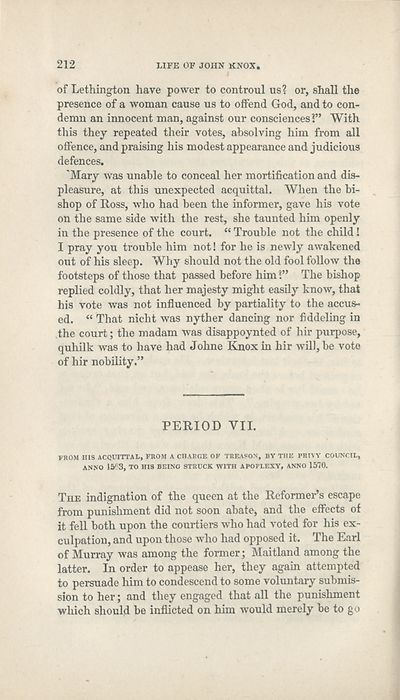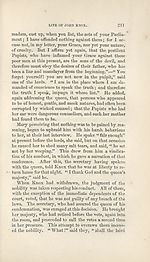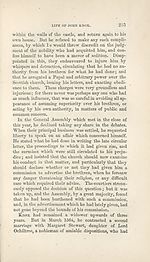Download files
Complete book:
Individual page:
Thumbnail gallery: Grid view | List view

212
UFE OF JOHN KNOX.
of Lethington have power to controul us? or, shall the
presence of a woman cause us to offend God, and to con¬
demn an innocent man, against our consciences 1” With
this they repeated their votes, absolving him from all
offence, and praising his modest appearance and judicious
defences.
'Mary was unable to conceal her mortification and dis¬
pleasure, at this unexpected acquittal. When the bi¬
shop of Ross, who had been the informer, gave his vote
on the same side with the rest, she taunted him openly
iu the presence of the court. “ Trouble not the child!
I pray you trouble him not! for he is newly awakened
out of his sleep. Why should not the old fool follow the
footsteps of those that passed before him 2” The bishop
replied coldly, that her majesty might easily know, that
his vote was not influenced hy partiality to the accus¬
ed. “ That nicht was nyther dancing nor fiddeling in
the court; the madam was disappoynted of hir purpose,
quhilk was to have had Johne Knox in hir will, be vote
of hir nobility.”
PERIOD VII.
FROM BIS ACQUITTAL, FROM A CHARGE OF TREASON, BV THE PRIVY COUNCIL,
ANNO )5fi3, TO HIS BEING STRUCK WITH APOPLEXY, ANNO 1570.
The indignation of the queen at the Reformer’s escape
from punishment did not soon abate, and the effects of
it fell both upon the courtiers who had voted for his ex¬
culpation, and upon those who had opposed it. The Earl
of Murray was among the former; Maitland among the
latter. In order to appease her, they again attempted
to persuade him to condescend to some voluntary submis¬
sion to her; and they engaged that all the punishment
which should be inflicted on him would merely be to go
UFE OF JOHN KNOX.
of Lethington have power to controul us? or, shall the
presence of a woman cause us to offend God, and to con¬
demn an innocent man, against our consciences 1” With
this they repeated their votes, absolving him from all
offence, and praising his modest appearance and judicious
defences.
'Mary was unable to conceal her mortification and dis¬
pleasure, at this unexpected acquittal. When the bi¬
shop of Ross, who had been the informer, gave his vote
on the same side with the rest, she taunted him openly
iu the presence of the court. “ Trouble not the child!
I pray you trouble him not! for he is newly awakened
out of his sleep. Why should not the old fool follow the
footsteps of those that passed before him 2” The bishop
replied coldly, that her majesty might easily know, that
his vote was not influenced hy partiality to the accus¬
ed. “ That nicht was nyther dancing nor fiddeling in
the court; the madam was disappoynted of hir purpose,
quhilk was to have had Johne Knox in hir will, be vote
of hir nobility.”
PERIOD VII.
FROM BIS ACQUITTAL, FROM A CHARGE OF TREASON, BV THE PRIVY COUNCIL,
ANNO )5fi3, TO HIS BEING STRUCK WITH APOPLEXY, ANNO 1570.
The indignation of the queen at the Reformer’s escape
from punishment did not soon abate, and the effects of
it fell both upon the courtiers who had voted for his ex¬
culpation, and upon those who had opposed it. The Earl
of Murray was among the former; Maitland among the
latter. In order to appease her, they again attempted
to persuade him to condescend to some voluntary submis¬
sion to her; and they engaged that all the punishment
which should be inflicted on him would merely be to go
Set display mode to:
![]() Universal Viewer |
Universal Viewer | ![]() Mirador |
Large image | Transcription
Mirador |
Large image | Transcription
| Antiquarian books of Scotland > Scotland/Scots > Life of John Knox ; and, The life of Alexander Henderson > (230) |
|---|
| Permanent URL | https://digital.nls.uk/131835064 |
|---|
| Description | Thousands of printed books from the Antiquarian Books of Scotland collection which dates from 1641 to the 1980s. The collection consists of 14,800 books which were published in Scotland or have a Scottish connection, e.g. through the author, printer or owner. Subjects covered include sport, education, diseases, adventure, occupations, Jacobites, politics and religion. Among the 29 languages represented are English, Gaelic, Italian, French, Russian and Swedish. |
|---|

